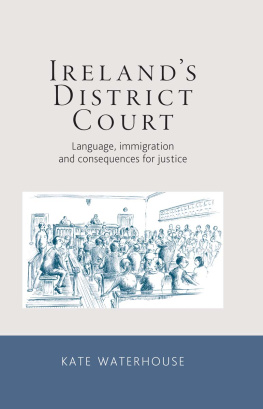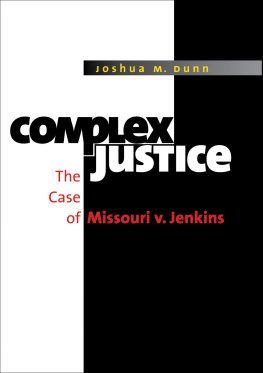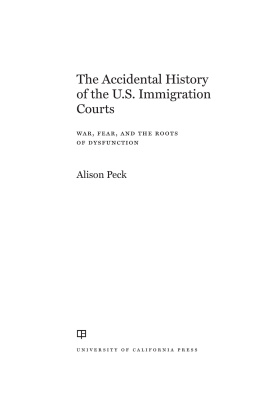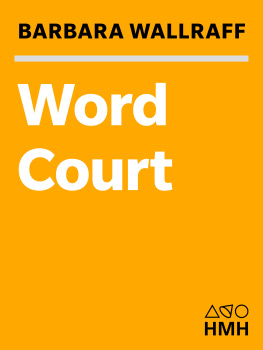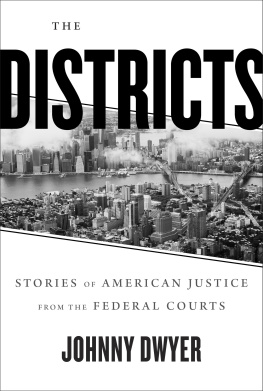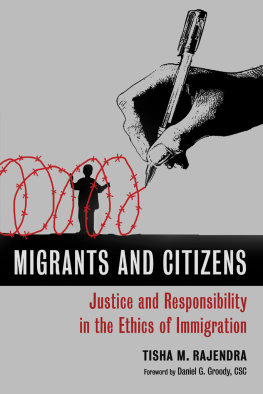Irelands District Court
Language, immigration and consequences for justice
KATE WATERHOUSE
Manchester University Press
Manchester and New York
distributed in the United States exclusively
by Palgrave Macmillan
Copyright Kate Waterhouse 2014
The right of Kate Waterhouse to be identified as the author of this work has been asserted by her in accordance with the Copyright, Designs and Patents Act 1988.
Published by Manchester University Press
Altrincham Street, Manchester M1 7JA, UK
and Room 400, 175 Fifth Avenue, New York, NY 10010, USA
www.manchesteruniversitypress.co.uk
Distributed in the United States exclusively by
Palgrave Macmillan, 175 Fifth Avenue, New York,
NY 10010, USA
Distributed in Canada exclusively by
UBC Press, University of British Columbia, 2029 West Mall,
Vancouver, BC, Canada V6T 1Z2
British Library Cataloguing-in-Publication Data
A catalogue record for this book is available from the British Library
Library of Congress Cataloging-in-Publication Data applied for
ISBN 978 0 7190 9527 6
First published 2014
The publisher has no responsibility for the persistence or accuracy of URLs for any external or third-party internet websites referred to in this book, and does not guarantee that any content on such websites is, or will remain, accurate or appropriate.
Typeset in Sabon and Gill by Servis Filmsetting Ltd, Stockport, Cheshire
For the mothership, for everythingContents
List of tables and figures
Tables
Figures
Preface
This book originated in a PhD research thesis carried out in the School of Social Work and Social Policy in Trinity College Dublin under the supervision of Dr. Eoin OSullivan, and within the context of the then Trinity Immigration Initiative (TII); it was financed in part by a Trinity College studentship and in part by the TII. The field research period spanned 2009 and 2010 and involved eighteen semi-structured interviews with solicitors, barristers and interpreters, as well as seven months (or a total of forty-five days, or 183.5 hours) sitting as a fascinated observer in a number of District Courts: one, a busy city centre court in Dublin; the second, a custody court outside Dublin city centre; and the third, which appears in the text collectively as a rural court, a set of three courts in medium to large towns outside of Dublin, between which the same judge moved on different days. A total of twelve judges and a vast number of defendants and cases, probably in excess of a thousand, were observed.
The research, which began as part of a wider immigration project, initially aimed to observe how the cases of immigrants with few or no English-language skills (Limited English-proficient, or LEP) were dealt with by the Irish District Court on the basis that rising numbers of LEP defendants were being processed by the justice system; that the District Court was inevitably dealing with the vast majority of them; and that while language and interpreting issues were being identified as a major issue in Irish courts (and have proven historically and theoretically to be of great import), nothing was known about the new reality of enforced contact between court and LEP immigrant or the implications for justice and the justice system of how both sides reacted and interacted. As observations began, however, and the structure of District Court proceedings meant also being present for hundreds of non-LEP cases, it quickly became apparent that not only were such cases extremely interesting per se in terms of understanding the structure and nature of proceedings in the District Court, but that the question of how LEP defendants were processed, and any analysis of how interpreting facilitated that process, was intrinsically linked to the basic structure and discourse of the generic District Court case and to the characteristics and dynamics of the District Court itself.
The result is an original decriptive analysis of the language, discourse and procedure of the District Court as well as an analysis of the significant changes made to the caseload and processing of the District Court by the advent of the LEP defendant, and the implications of those changes for justice.
Acknowledgements
It is difficult to express and impossible to quantify the degree of support I have been given in completing this book. The funding and support of Trinity College and the Trinity Immigration Initiative, and the additional support and opportunities afforded by the School of Social Work and Social Policy and its heads first Prof. Robbie Gilligan and then Dr. Eoin OSullivan have been far-reaching and are much appreciated. For the other hats of supervisor, mentor and supporter that he has worn in this process, I owe Eoin further debts of sincere gratitude. For their enthusiasm, support and invaluable feedback as my PhD examiners, I sincerely thank Prof. Ivana Bacik and Prof. Donncha OConnell. Thanks for further financial support go to Westmeath County Council and to the Polish Embassy for providing a wonderful scholarship to study in Warsaw. Many, many people facilitated and took part (often unknowingly) in the research process that has led to this book, and I would like to express my appreciation of the help and support provided by the Irish Courts Service, the President of the District Court and the Presidents Office, the registrars who took time out of their busy day to help me, and the judges, court staff, court participants and all of the research participants who gave so generously of their time, expertise and experience. For the support, belief and unfailing encouragement of my friends and family, I cannot thank them enough; I will not forget the calls, the coffees, the lunches and the Lemsips that somehow materialised when needed. Particular appreciation and recognition is due for the support and contributions of Niall MacGiollabhu, Natalie Woodward and Alana Smith, and, as ever, deepest thanks to Tom Waterhouse for being both a rock and a brick. Finally, I would like to thank Manchester University Press most sincerely for their support.
Abbreviations
| CJA | Criminal Justice Act |
| CitC | City Centre Court |
| CusC | Custody Court |
| Directive (the) | EU Directive on the Right to Interpretation and Translation in Criminal Proceedings |
| DPP | Director of Public Prosecutions |
| ECHR | European Convention on Human Rights |
| ECtHR | European Court of Human Rights |
| ICCPR | International Covenant on Civil and Political Rights |
| IPRT | Irish Penal Reform Trust |
| ITIA | Irish Translators and Interpreters Association |
| LEP | Limited English-Proficient |
| MJELR | Minister for Justice, Equality and Law Reform |
| NCCRI | National Consultative Committee on Racism and Interculturalism |
| ORAC | Office of the Refugee Applications Commissioner |
| RAT | Refugee Appeals Tribunal |
| RC | Rural Court |
Guide to extracts from District Court field notes and interviews
are based directly on interviews and ethnographic research carried out in a number of Irish District Courts in 2009 and 2010 (Appendix A (Methodology); Appendix B (Participants)). All citations are from interviews or court observations.

